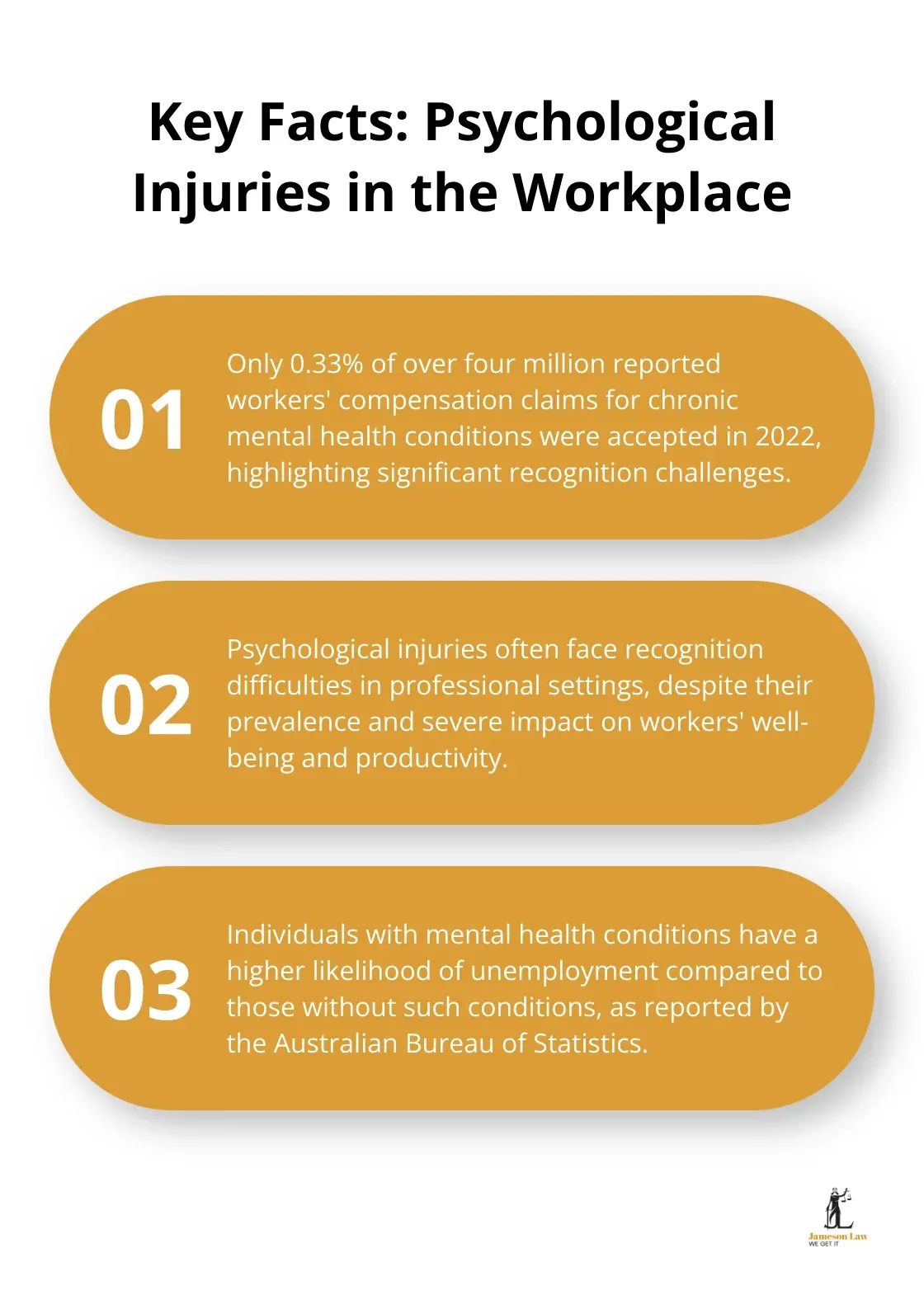Psychological injuries can be just as devastating as physical ones, yet they often go unrecognised or misunderstood. At Jameson Law, we’ve seen firsthand the impact these invisible wounds can have on a person’s life and wellbeing.
Filing common law claims for psychological injury requires a thorough understanding of legal processes and medical evidence. This guide will walk you through the essential steps to seek compensation and justice for your mental health struggles.
What Are Psychological Injury Claims?
Definition and Legal Recognition
Psychological injury claims in Australian law seek compensation for mental harm caused by another party’s negligence. These claims are recognised under the Civil Liability Act 2002 (NSW) and similar legislation in other states. The legal system acknowledges that mental health injuries can be as severe and life-altering as physical ones. Recent legislative changes continue to affect how psychological injury solicitors pursue these cases.
Common Types of Psychological Injuries
The most frequent psychological injuries in legal claims include:
![]() Post-Traumatic Stress Disorder (PTSD)
Post-Traumatic Stress Disorder (PTSD)
![]() Depression
Depression
![]() Anxiety disorders
Anxiety disorders
![]() Adjustment disorders
Adjustment disorders
Reports from national agencies highlight how mental health claims affect workplaces and individuals across Australia.
Workplace Recognition Challenges
Despite their prevalence, psychological injuries often face recognition challenges in the workplace. Safe Work Australia reports show a very low acceptance rate of chronic mental health compensation claims, underscoring the difficulties in validation. Seeking workers compensation solicitors is essential to navigate these barriers effectively.

Impact on Daily Life
Psychological injuries can lead to severe life disruptions. They affect:
![]() Cognitive function
Cognitive function
![]() Sleep patterns
Sleep patterns
![]() Personal relationships
Personal relationships
![]() Employment prospects
Employment prospects
These impacts can be just as debilitating as physical injuries, often leading to loss of income, ongoing medical expenses and extended treatment.
Legal Elements for a Successful Claim
To file a successful psychological injury claim, you must establish several key elements:
![]() Duty of Care: Prove that the defendant owed you a duty of care.
Duty of Care: Prove that the defendant owed you a duty of care.
![]() Breach of Duty: Show that the defendant failed to prevent foreseeable harm.
Breach of Duty: Show that the defendant failed to prevent foreseeable harm.
![]() Causation: Link the negligence directly to your injury.
Causation: Link the negligence directly to your injury.
![]() Diagnosis: Obtain a formal diagnosis from a qualified professional.
Diagnosis: Obtain a formal diagnosis from a qualified professional.
Precedents such as Koehler v Cerebos (Australia) Ltd shape how courts assess employer liability for psychiatric injuries.
Meeting Eligibility Requirements for Psychological Injury Claims
Establishing a Duty of Care
The foundation of any claim is proving a duty of care. In workplaces, this is often straightforward as employers must provide a safe environment, including mental health. Outside of employment, these arguments become more complex, and legal advice is strongly recommended.
Proving Negligence or Breach of Duty
After establishing duty, you must prove negligence. Courts assess this under the Civil Liability Act 2002. Factors include the probability and seriousness of harm, the burden of taking precautions, and the utility of the conduct. Understanding these legal standards with the help of No Win No Fee solicitors can make a decisive difference.
Demonstrating Causation
You must prove a direct link between the incident and your condition. Medical evidence from psychiatrists and psychologists is essential. Personal injury law in NSW requires that work-related or negligent conduct be the primary contributing factor.
Time Limits for Filing Claims
Strict time limits apply. In NSW, compensation claims must usually be filed within three years from the date of injury discovery. For workers’ compensation claims, reporting should occur within six months. Missing these deadlines can severely impact your rights.
How to File Your Psychological Injury Claim
Seek Immediate Medical Assessment
Obtain a psychiatric or psychological assessment promptly. This provides the diagnosis and treatment plan that will anchor your case. Courts and insurers place significant weight on early medical documentation.
Document Everything
Keep a detailed journal of your symptoms, daily impact, and medical treatment. Also keep emails, HR correspondence, and witness statements. Financial records such as lost wages and medical bills should also be preserved to support your compensation claim.
Consult a Specialised Solicitor
Consulting a psychological injury solicitor is vital. They will assess your claim, gather evidence, negotiate with insurers, and represent you in court if necessary. Specialist lawyers in Sydney also offer insights into overlapping legal areas such as workplace misconduct or discrimination.
File Your Claim Correctly
Once evidence is gathered, your solicitor will draft and lodge your Statement of Claim. Ensure this is done within statutory limits. A properly prepared common law claim increases your likelihood of success.
Navigate the Negotiation Process
Negotiations with insurers are common. Insurers may attempt to deny liability or reduce payout values. Experienced No Win No Fee solicitors will ensure your rights are protected during this stage.
Final Thoughts
Filing psychological injury claims requires legal expertise, strong medical evidence, and prompt action. Immediate medical assessments, meticulous documentation, and expert legal guidance are the pillars of a successful case.
We at Jameson Law provide tailored support for psychological and personal injury matters. Our extensive experience with compensation law in NSW ensures we can guide you effectively. With our No Win No Fee arrangements, you can pursue justice with confidence.













